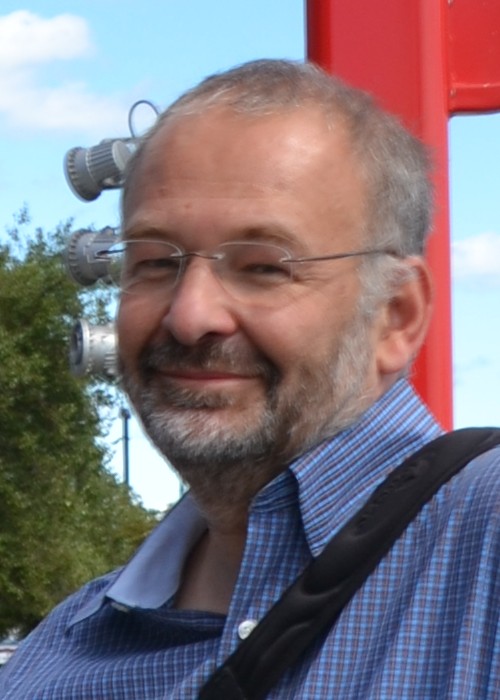Colloquium in Honour of Lutz Hille

Lutz Hille (Photo: Eleonore Faber)
There will be a colloquium at Bielefeld University in honour of Lutz Hille on the occasion of his 60th birthday, featuring his broad interest in representation theory of finite dimensional algebras and algebraic geometry.
Location: Bielefeld University. All talks are given in room V2-210/216, the coffee break takes place in room V3-201.
Date: Friday 15 November 2024
Programme: Three talks will be given in the afternoon, and there will be a social dinner in the evening. Please see the detailed programme for more information.
Registration: There is no formal registration, but we appreciate a short message to Melanie Kreimeyer (at sekalgebra) if you plan to come. Please indicate if you wish to join for the social dinner.
Organisers: William Crawley-Boevey and Henning Krause
Speakers
Programme
| 13:15 | – | 14:15 | Severin Barmeier (Cologne) Associative algebras from Fukaya categories |
| 14:30 | – | 15:30 | Eleonore Faber (Graz, Leeds) Semi-orthogonal decompositions of the category of equivariant coherent sheaves for some complex reflection groups via the McKay correspondence |
| Coffee break in room V3-201 | |||
| 16:00 | – | 17:00 | Klaus Altmann (Berlin) The structure of full exceptional sequences of line bundles on toric varieties of Picard rank two |
| 18:30 | – | Dinner at Restaurant Numa |
Abstracts
Klaus Altmann (Berlin)
The structure of full exceptional sequences of line bundles on toric varieties of Picard rank two
For a smooth projective toric variety of Picard rank two we classify all exceptional sequences of invertible sheaves which have maximal length. In particular, we prove that unlike non-maximal sequences, they
- remain exceptional under lexicographical reordering
- satisfy strong height constraints in the Picard lattice
- are full, that is, they generate the derived category of the variety.
Moreover, we determine the exceptional poset of those sequences and show how
this poset governs the property "strongly exceptional".
(This is joint work with Frederik Witt, Stuttgart; see ALCO = Algebraic
Combinatorics, Volume 7 (2024) no. 4, pp. 1039-1074)
Severin Barmeier (Cologne)
Associative algebras from Fukaya categories
Tilting theory is a classical subject linking algebraic geometry and
representation theory. For example, a result of Hille and Perling establishes
the existence of a tilting bundle on any rational surface which shows that the
derived category of coherent sheaves on the surface is equivalent to the derived
category of modules over a finite-dimensional quasi-hereditary algebra.
In this talk I will pursue a similar idea linking representation theory and
symplectic geometry. More concretely, I will explain how formal generators of
partially wrapped Fukaya categories of orbifold surfaces give rise to new
classes of derived tame finite-dimensional algebras which conjecturally describe
the full class of algebras which are derived equivalent to skew-gentle algebras.
These algebras also admit an explicit description via quivers with relations and
although they are generally ℤ-graded, when concentrated in degree 0, they fall
squarely into the domain of representation theory of finite-dimensional algebras
just as in the case of tilting theory.
Eleonore Faber (Graz, Leeds)
Semi-orthogonal decompositions of the category of equivariant coherent sheaves for some complex reflection groups via the McKay correspondence
This talk is about an extension of the derived McKay correspondence for finite subgroups of SU(2) to complex reflection groups of rank 2 generated by reflections of order 2: The classical McKay correspondence connects the representation theory of a finite group in SU(2) and the geometry of the exceptional divisor of the minimal resolution of the corresponding quotient singularity. Kapranov and Vasserot showed that this may be realized as a derived equivalence between the derived category of coherent sheaves on the minimal resolution, and the derived category of equivariant coherent sheaves on the two-dimensional vector space the group is acting on. On the other hand, for a complex reflection group of rank 2 generated by order 2 reflections, the quotient is smooth. Using that each such reflection group contains a distinct subgroup of SU(2) as a subgroup of index 2, we derive a semi-orthogonal decomposition of the category of equivariant coherent sheaves, where the derived category of the quotient is one piece, and the other pieces are coming from branch divisors and exceptional objects. In particular, the total number of pieces of this decomposition is equal to the number of irreducible representations of the reflection group and it can be related to the (conjectured) motivic semi-orthogonal decomposition of the derived categories of equivariant coherent sheaves for the reflection groups of Polishchuk and Van den Bergh. This is joint work with A. Bhaduri, Y. Davidov, K. Honigs, P. MacDonald, E. Overton-Walker, and D. Spence.
Funding
The colloquium is supported by the Deutsche Forschungsgemeinschaft (DFG, German Research Foundation) via the TRR 358 "Integral Structures in Geometry and Representation Theory" (SFB-TRR 358/1 2023 – 491392403).
Contact
If you have any questions about the colloquium, please contact the organisers at birep.